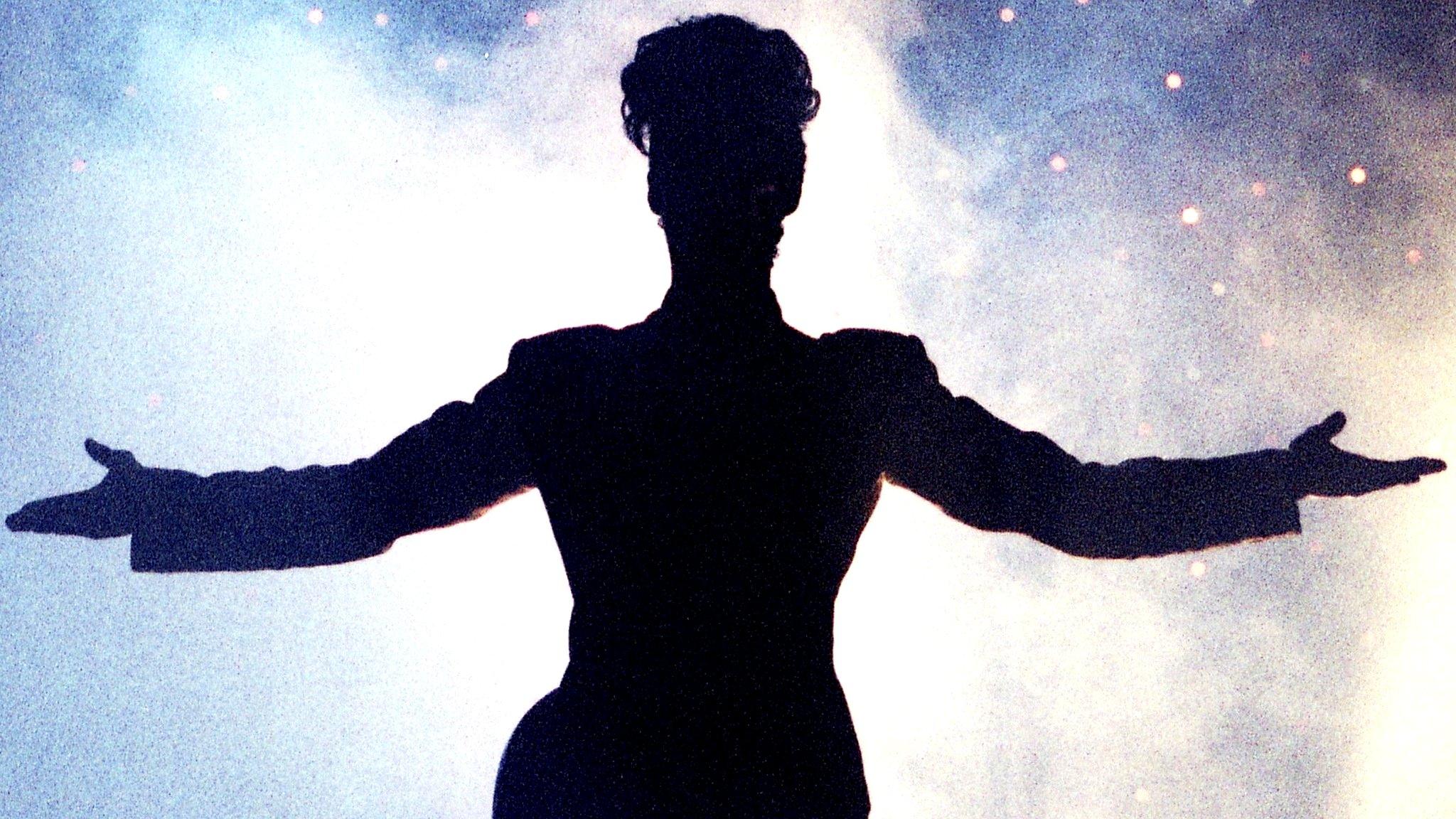'It's Prince, thinking aloud on the piano'
- Published
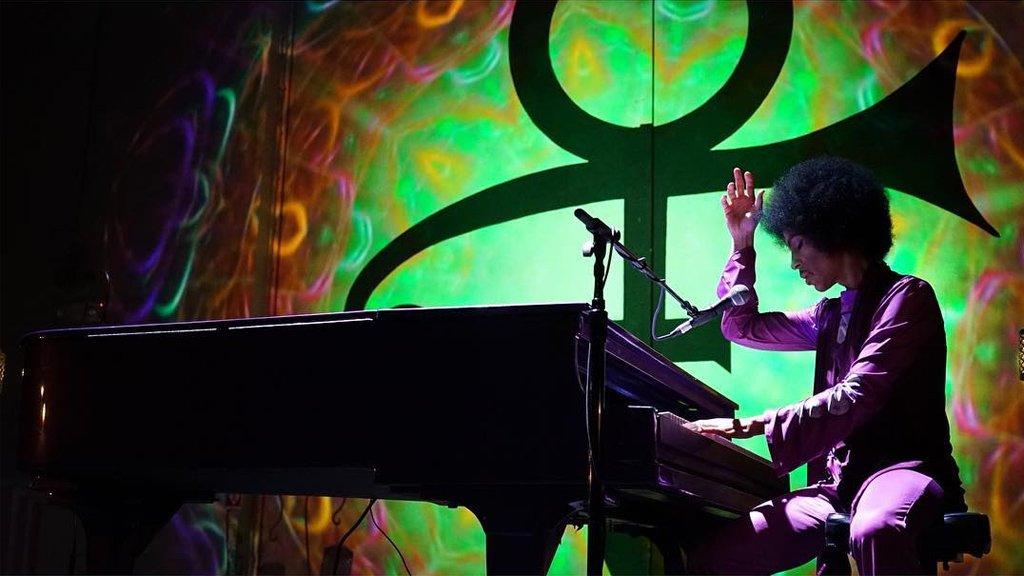
Prince's final tour saw him playing solo at the piano, for the first time in his career
"Is that my echo? Can you turn the lights down? Good God!"
It's January 1983 and Prince is sitting at the piano in his home studio in Minneapolis. He has a cassette recorder, some spare time and a bunch of songs in his head.
Over the next 35 minutes, he stomps his feet and stretches his muscles, careering through gospel, jazz, funk and - for 88 tantalising seconds - a nascent version of Purple Rain.
Then he gets up, chucks the tape in his vault and goes off to become a megastar.
For years, the cassette languished in Prince's cavernous archive, identified only by a hand-written label reading "Cold Coffee & Cocaine" - a song he'd seemingly made up on the spot.
But now the tape is being released as Prince: Piano And A Microphone 1983; the first in what will presumably be a stream of posthumous records.
By highlighting this intimate, insightful performance, the star's estate is making a statement about how it intends to treat his archive - not as a cash cow, but as a way to explore and illuminate Prince's extraordinary creativity.
Ahead of the album's release, we spoke to archivist Michael Howe and musician Lisa Coleman - who played keyboards in Prince's band, The Revolution - about the new album, and what else we might hear from the vault.

LISA COLEMAN
Had you heard this cassette before? Would Prince have shared it with the band?
He wouldn't have played this for the band, no. The tape is sort of Prince working on himself and wanting to get to know the songs a little better.
Was that common?
Oh yeah. Prince studied himself, you know? We videotaped every rehearsal, then watched the tapes while we ate. There were tapes everywhere.
I think this one is just a lucky find - because it's really interesting and concise. And it's just really cool to hear him thinking out loud.
There's an early version of Purple Rain on the tape. Do you remember the first time he played it for you?
The first time was at rehearsal - but he never played us a full version. I don't even know a full version existed until we all played it together.
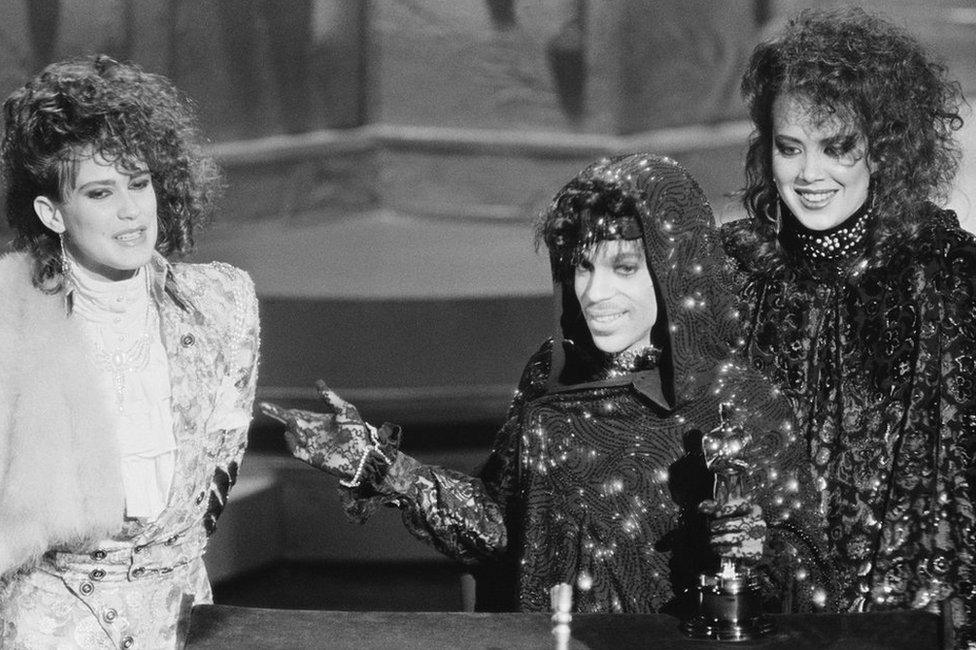
The score for Purple Rain earned an Oscar for Prince and his bandmates Wendy Melvoin (left) and Lisa Coleman
Is it true he intended to give the song away?
Well, he thought it was just a country song. He thought it would be for Willie Nelson or Dolly Parton.
The thing that made him decide to explore it further was the way that Wendy [Melvoin, guitarist] played that famous intro. Those inversions of the chords are what really sold Prince on developing the song - because somehow it started to sound like his band, and he got really happy and we recorded the song. I think it worked out alright!
One of the other songs on the tape, Wednesday, was included on an early configuration of the Purple Rain soundtrack. Did you record a full band version of it?
No. Not at all. That song, or at least that melody, was with him for a long time but I think he never quite found out where it belonged.
And then there's Cold Coffee & Cocaine, which Prince sings in his "Jamie Starr" voice - a sort of profane caricature of James Brown. What was that side of him like?
He was very funny - and that Cold Coffee & Cocaine character was such a big part of him. He eventually created [spin-off band] The Time because that humour didn't fit the image that he was creating for himself as Prince, who was a little more perfect and didn't have those hard edges and that craziness.
But he was hilarious. We'd have rehearsals where he'd be Jamie Starr all day; or he'd pretend to be a Reverend and we'd pretend we were at church. We were pretty crazy.
Allow YouTube content?
This article contains content provided by Google YouTube. We ask for your permission before anything is loaded, as they may be using cookies and other technologies. You may want to read Google’s cookie policy, external and privacy policy, external before accepting. To view this content choose ‘accept and continue’.
He was better known as a guitarist than a pianist. Do you think he's underrated in that regard?
Yeah, he was very accomplished. What you hear on the tape is how comfortable he was not only with certain styles but also with breaking the style. Like, he's jamming on a gospel thing and then it goes jazzy and suddenly there's a Joni Mitchell cover.
But it's not incongruous. It's not like you suddenly go, "Ugh! What did he do? That's gross!"
The Revolution reformed after Prince's death, and you're coming to the UK next year. It's definitely helped fans grieve, but how about you?
We found out we needed the fans just as much as they needed us. The grief will never go away - but neither will his music. So we can fight right back.

MICHAEL HOWE
What an incredible job you have!
Yeah, it's a pretty mind-bending experience on a number of levels.
What state was the archive in when you started?
Well, the material is organised in what I would call, at best, an unconventional way. A lot of the tapes are grouped together by type, and a lot of the labels are either incomplete or incorrect. So it's a bit of a detective operation.
I've approached it as if I were a preservationist sitting in a room of fine art at the Louvre. Around me are scattered an enormous amount of priceless artefacts and I've been cataloguing them chronologically. For two reasons: One, it seems to be the path of least resistance; and two, those assets are potentially the most distressed or damaged.
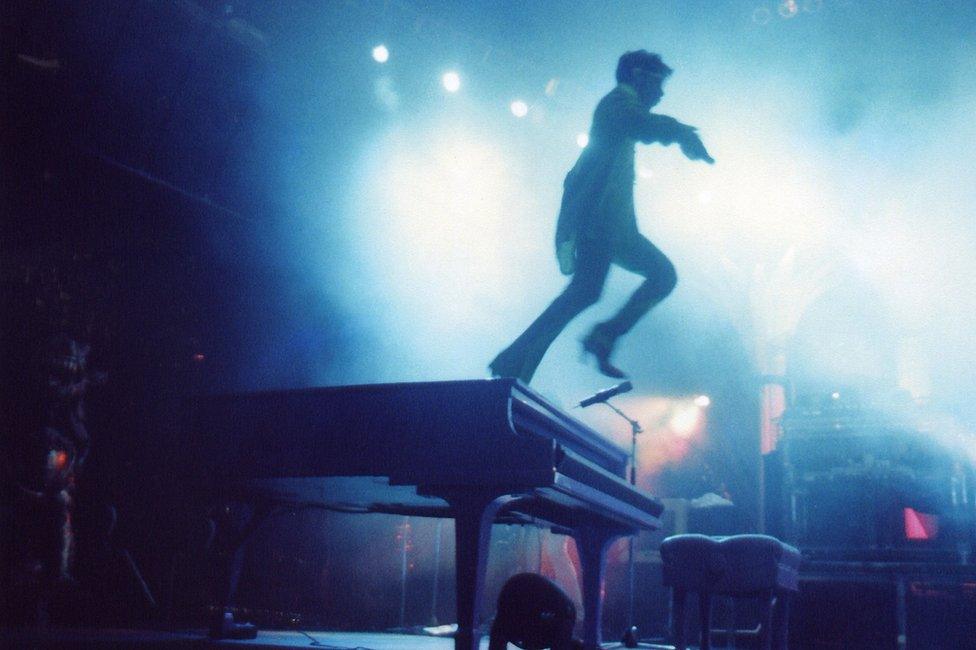
The star was better known for jumping off pianos than playing them
How did you come across this recording?
I was aware of it for a number of years because it had been circulating in the bootleg community, albeit in substandard audio. But the performance is so riveting that it was among the first things I wanted to find when the archival process began.
Given what I knew about the era and the quality of recording, I knew it was on a cassette. So we started a process of elimination until we found a [tape] with a label in Prince's handwriting that said "Cold Coffee & Cocaine" and "Why The Butterflies" and, sure enough, when we put it in the machine we hit the jackpot.
What did you have to do to polish up the audio for release?
Very little, to tell you the truth. It was in remarkably good condition.
Do we have any clues about why Prince taped this particular rehearsal?
We don't know a tremendous amount, aside from knowing that he was a wildly creative guy who was inclined to sit down and hammer out whatever was coursing through his veins.
So it's basically, in my estimation, Prince just thinking aloud on the piano.
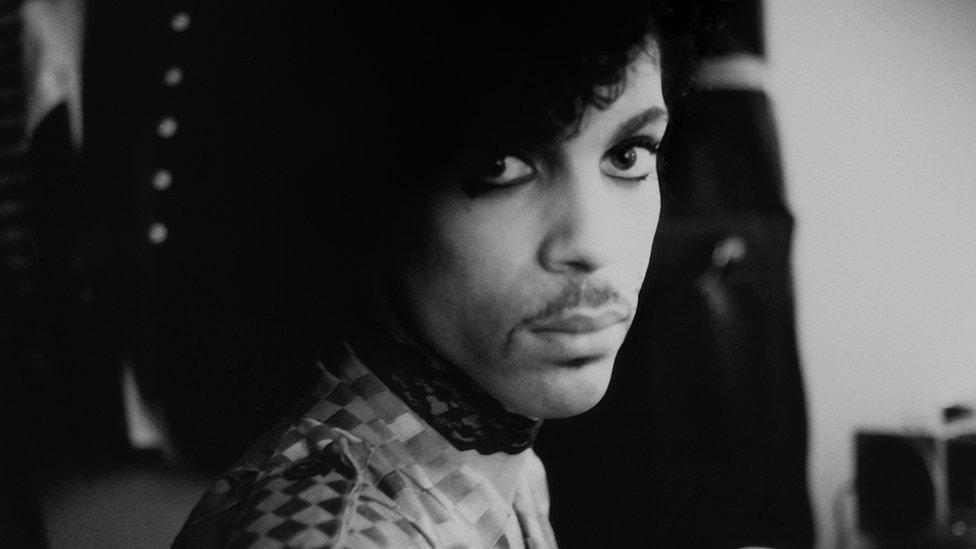
The rehearsal was recorded in 1983 at Prince's house in Kiowa Trail, just outside Minneapolis
Would he have intended for the public to hear it?
I think, for the most part, it was intended for his personal use.
But it's a compelling listen. You're hearing an artist at the moment inspiration strikes.
I agree. It's certainly a pretty interesting peek behind the curtain, especially during a period of Prince's creative evolution when he was known primarily as a guitar player.
There are a couple of unreleased songs on the tape. Are there complete versions in the vault?
I believe those songs are one-offs. I have not come across any other recordings of Cold Coffee or Why The Butterflies. My suspicion is that Cold Coffee is largely improvised - although probably intended for Morris Day and The Time.
How much of the vault do you reckon you've catalogued and listened to?
Well, this is where we get into a delicate area - because I have signed a constellation of non-disclosure agreements with the estate [but] it's a relatively small percentage that we've digitised and reviewed.
You said you deliberately sought out this tape. Is there anything else you want to hunt down?
I can tell you this: Everything that I was hoping was in there is certainly in there, and many multiples more. Things that were only even rumoured to exist or that were completely unknown to anybody but Prince and whatever engineer was involved in the session.
Narrowing that down is a very formidable task - but I think people will get a tremendous level of satisfaction and joy from what's to come.
For me, any excitement is tempered by the realisation I'm hearing these songs because of a terrible tragedy.
That's something I think about every day, too. I just want to do right by the guy, so we take it very seriously.
Whenever we're contemplating something for release, we consider what Prince would think about it. I mean, he was a fickle guy and a no-one can be sure what he'd be thinking - but we use our best judgement and try to make the best decisions we can.
Prince: Piano And A Microphone 1983 is released on Friday, 21 September.

Follow us on Facebook, external, on Twitter @BBCNewsEnts, external, or on Instagram at bbcnewsents, external. If you have a story suggestion email entertainment.news@bbc.co.uk, external.

- Published20 March 2015
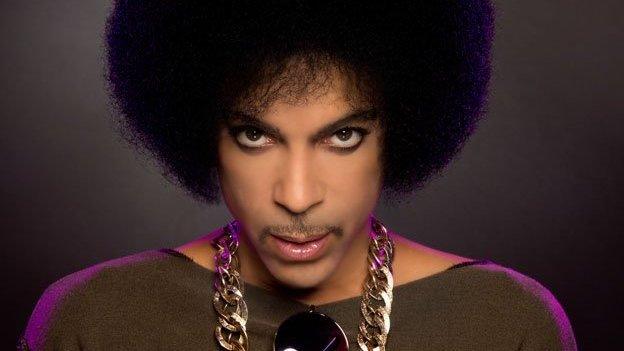
- Published20 April 2018
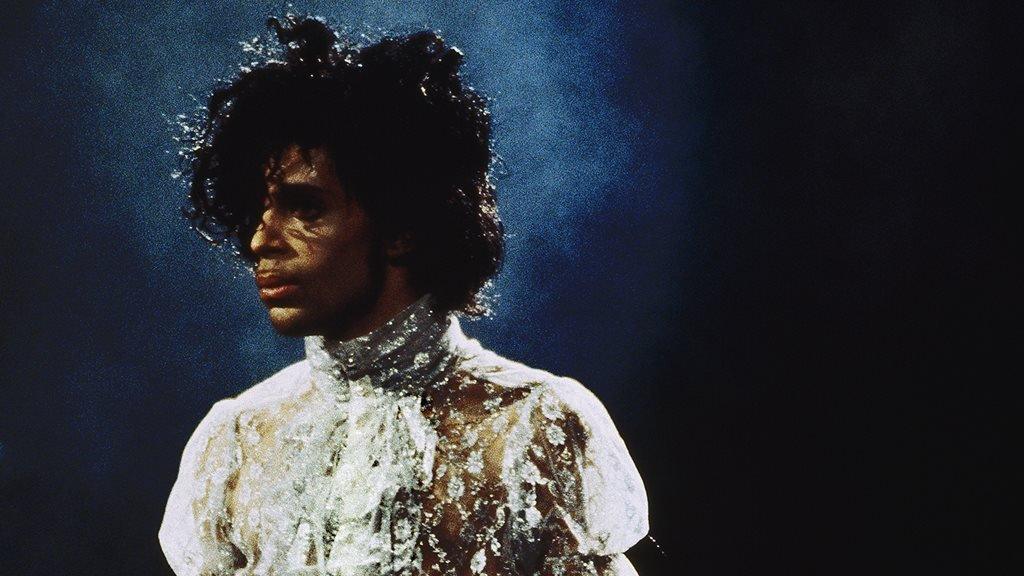
- Published20 April 2017
